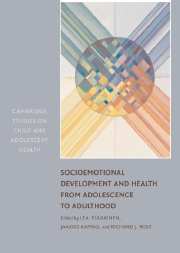Book contents
- Frontmatter
- Contents
- List of Contributors
- Preface
- Introduction
- PART I LONGITUDINAL AND BEHAVIORAL GENETIC APPROACHES
- PART II ADOLESCENT HEALTH-RELATED BEHAVIOR AND ADULT HEALTH
- PART III SOCIOEMOTIONAL BEHAVIOR IN EARLY ADOLESCENCE
- PART IV LIFE COURSE AND HEALTH
- Summary and Future Directions
- References
- Author Index
- Subject Index
Summary and Future Directions
Published online by Cambridge University Press: 07 December 2009
- Frontmatter
- Contents
- List of Contributors
- Preface
- Introduction
- PART I LONGITUDINAL AND BEHAVIORAL GENETIC APPROACHES
- PART II ADOLESCENT HEALTH-RELATED BEHAVIOR AND ADULT HEALTH
- PART III SOCIOEMOTIONAL BEHAVIOR IN EARLY ADOLESCENCE
- PART IV LIFE COURSE AND HEALTH
- Summary and Future Directions
- References
- Author Index
- Subject Index
Summary
Readers who have persevered to this concluding chapter, having read the book's introduction and some or all of the substantive presentations in between, can gauge how well the chapters answered the questions posed in the Introduction: Why longitudinal research? Why twin studies? And why conduct them in Finland?
This edited book rests on data sets of truly exceptional informational value. The long-term, ongoing longitudinal study (Jyväskylä Longitudinal Study on Personality and Social Development, JYLS) is one of the few such resources available. It was started with 8-year-old children in 1968, and the latest data were collected in 2001, when the participants were 42 years old. Multiple informants and measures were used on multiple assessment occasions. The sample is representative of the age cohort born in Finland in 1959, using marital status, education, employment, and occupational status as comparison criteria. Comparisons with American, Canadian, and Swedish longitudinal studies have resulted in similar findings, which show that psychological phenomena are generalizable at least within the Western world.
As for the FinnTwin (FT) studies, one began when participant twins were age 16 (FT16) and another at age 12 (FT12). Both FT studies are population based, and each features essentially exhaustive identification of all twins in five consecutive nationwide birth cohorts. Each achieved nearly 90% participation across repeated waves of assessments. Jointly, about 5,000 twin pairs have been followed across periods of 5 to 10 years.
- Type
- Chapter
- Information
- Publisher: Cambridge University PressPrint publication year: 2006

